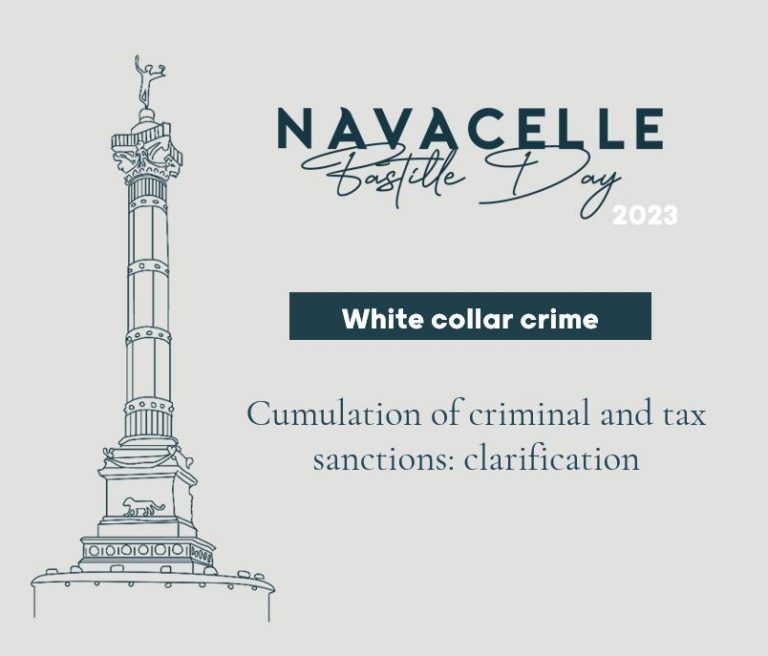Since the law of October 23, 2018, and in application of Article L228 I of the French Tax Procedure Book, when, in the course of an audit, the tax authorities pronounce an adjustment for which the amount of eluded duties exceeds €100,000 combined with the most serious penalties (i.e. 100%, 80% or 40% in the case of recidivism), they are required to forward the case file to the Public Prosecutor[1], who has the right to initiate proceedings.
Following a tax audit which led to an automatic denunciation by the tax authorities to the Public Prosecutor, the manager of the corporate taxpayer appeared before the Criminal Court (Tribunal correctionnel) on a charge of tax fraud. On this occasion, the defendant raised an objection of nullity aimed at having the investigation acts annulled, on the grounds that, in the context of his denunciation to the Public Prosecutor, the tax authorities had not transmitted the notice of assessment in order to assess compliance with the conditions of article L228 I of the French Tax Procedure Book. The Criminal Court then granted the defendant’s request.
Following an appeal by the Public Prosecutor and the tax authorities, the Versailles Court of Appeal, in its ruling of March 10, 2022, also upheld the defendant’s claim of nullity.
The Public Prosecutor and the tax authorities appealed to the Supreme Court.
The Public Prosecutor raised the argument that only failure to comply with the provisions of article L.47 of the French Tax Procedure Book[2], insofar as they are intended to guarantee the taxpayer’s rights of defense, could lead the criminal court to declare administrative operations prior to criminal prosecution for tax fraud null and void.
He also argued that article L.228 of the French tax procedure book, which provides for the denunciation of tax fraud, did not require the tax authorities to attach the tax assessment notice to the denunciation. The tax authorities also raised this argument.
In addition, the Public Prosecutor relied on the link between the administrative procedure and the criminal trial, and the competence of the repressive authority. He pointed out that the tax assessment notice did not constitute an individual administrative act that could be contested by way of exception before the criminal court, so that the criminal solution depended neither on the legality of the said notice, nor on the denunciation by the administration. Lastly, it was not for the criminal court to assess the conditions for reporting the facts as set out in article L.228 of the French tax procedure book.
The tax authorities argued that article L.228 of the French Tax Procedures Book referred to the surcharges retained “at the stage of assessment”, so that the tax authorities could base their assessment of the surcharges set on any documents relating to the assessment procedure. The production of the tax assessment notice at the stage at which the defendant contested the regularity of the procedure was sufficient.
Lastly, the tax authorities argued that the judges of the Versailles Court of Appeal had distorted the procedural documents by considering that the notice of assessment dated March 15, 2019 did not refer to the surcharges required to trigger the denunciation procedure, even though the said notice mentioned the sums due in respect of the surcharges and referred to the letter setting out the reasons for the denunciation.
On September 13, 2023, the Criminal Division of the French Supreme Court (Cour de cassation) overturned the decision of the Versailles Court of Appeal of March 10, 2022, which had held that the failure to attach the tax assessment notice to the report of tax fraud to the Public Prosecutor constituted grounds for invalidating the procedure.
The judges of the Criminal Division confirmed that article L.228 of the French Tax Procedures Book “does not stipulate that the mandatory denunciation must be accompanied by the notice of tax due, penalties and interest for late payment”.
They also held that the failure to attach the tax assessment notice did not constitute grounds for invalidating the procedure, as long as the judges were able to ascertain from other documents that the legal criteria for triggering the whistleblowing procedure had been met. In fact, the Criminal Division considered that the Court of Appeal should have ascertained, notably on the basis of the final rectification proposal and the administration’s response to the taxpayer’s observations, that the duties evaded exceeded €100,000 and were subject to a surcharge of 100%, 80% or 40%.










